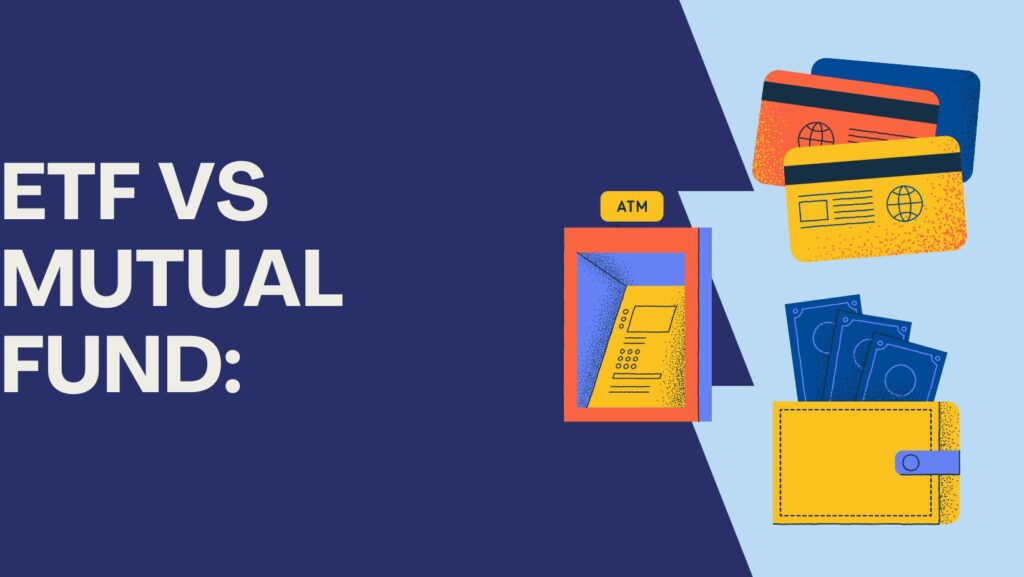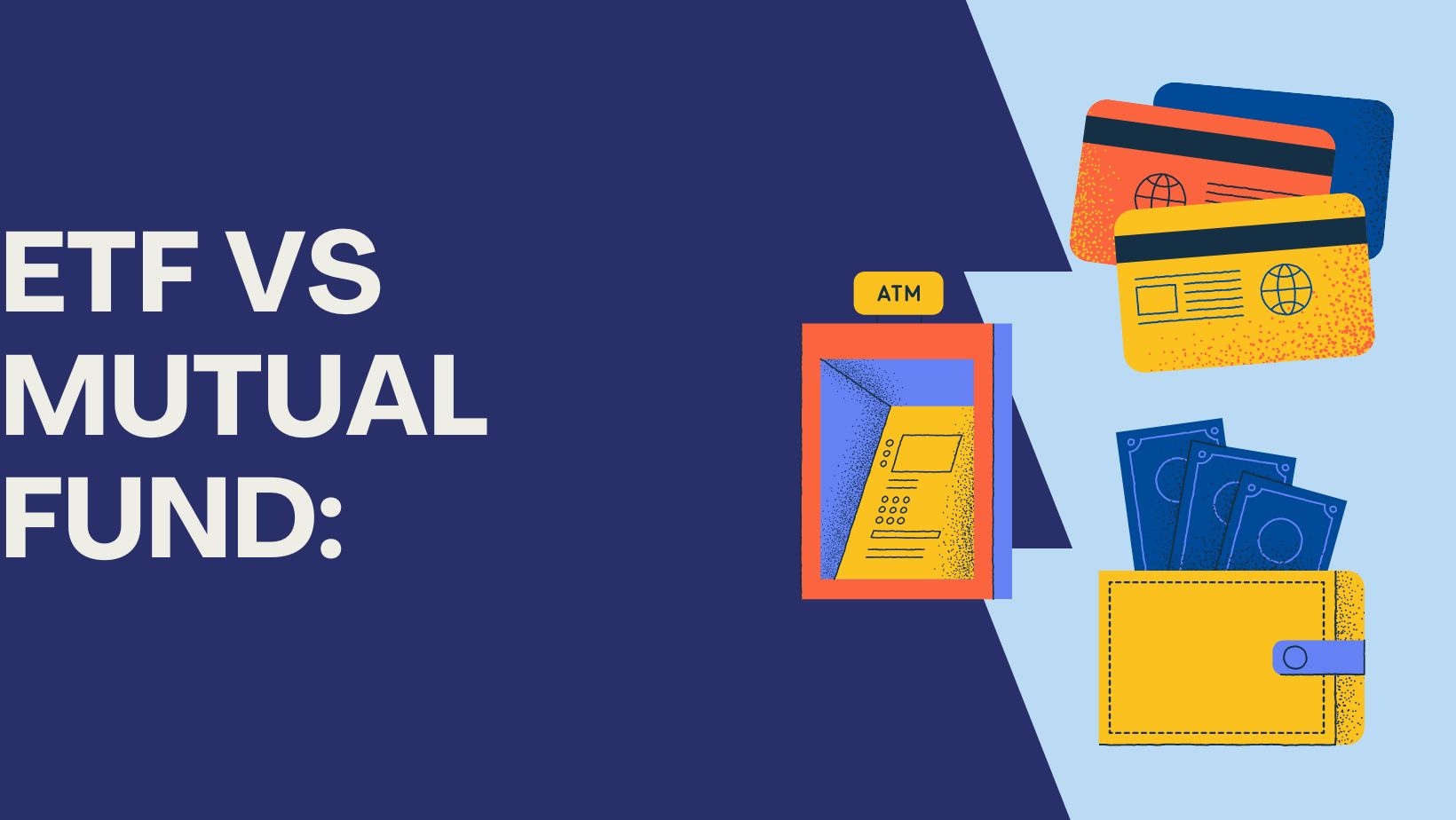
One of the most essential thing you have to do is to secure your financial future. There are several methods accessible to you to guarantee that your money creates adequate returns by your financial objectives.
Mutual funds and ETFs are two of the most popular investment alternatives for Indian investors. Both types of funds are a popular way for investors to diversify because they comprise several different assets.
When comparing ETFs vs Mutual Funds, investors often evaluate factors such as expense ratios, trading flexibility, and the nature of fund management. Read this post to learn about ETFs and mutual funds.
Also Read: Top 5 High-Interest Rates Paying Government Schemes – 2024
What are Mutual Funds?
Mutual funds are professionally managed investment plans that combine money from multiple investors and invest it in diversified holdings. Mutual funds invest in various investments, including stocks, bonds, debt instruments, and other assets. Each scheme has a defined NAV, which is calculated by dividing a mutual fund’s total investment by the number of investors.
What are ETFs?
ETFs, or Exchange Traded Funds, are passively managed funds and these funds typically hold stocks the same weight as the underlying index. ETFs are actively traded on a stock market and can be bought and sold anytime during the trading session.
Similarities Between ETFs and Mutual Funds
- Diversification
Diversification is a fundamental investment technique that spreads your investments across asset classes. Its major goal is to reduce risk.
ETFs and mutual funds provide much-needed diversification by investing in a portfolio of assets from various companies. In such cases, understanding the ETF meaning is essential for investors seeking flexibility and diversification in their investment strategies.
While ETFs provide diversification by investing in various securities from the index they monitor, mutual funds offer the same by investing in multiple stocks. So, in both circumstances, if one stock performs poorly, there is a probability that others will compensate.
- NAV
Both have NAVs that are determined at the end of each day. Their NAV is derived from the underlying securities. The calculation of NAV is the same for ETFs and mutual funds.
Experts calculate the NAV of a specific mutual fund or ETF by valuing individual securities and aggregating their prices. However, NAVs continue to fluctuate and are not steady.
- Variety of Investment Options
You have a variety of investment alternatives in both ETFs and mutual funds. You can invest in a fund or an ETF based on your financial objectives and risk tolerance.
Mutual funds are an option if you want to produce alpha. ETFs are a superior option if you wish to invest in stocks in the same proportion as an index.
Also Read: Best Investment Plan for 5 Years
Differences Between Mutual Funds and ETFs
- Mode of Transaction
ETFs can be bought and traded on stock exchanges at the current market price throughout the trading day. It is essential to have a Demat account or a trading account with a broker.
However, the situation is different in the case of mutual funds. Mutual funds can be purchased or sold directly through the AMC or authorized intermediaries. You do not need a Demat or trading account for mutual funds.
You are assigned the fund’s NAV, and units are credited or debited as directed. ETFs and mutual funds can be traded at any time, with ETFs using the existing market price and mutual funds relying on NAV according to the rules.
- Expense Ratio
The expense that the fund house charges you for managing your investment is known as the cost ratio. Expense ratios for mutual funds are higher than those for ETFs.
This is because their goal is to produce alpha, while ETFs attempt to replicate the index they monitor and hold equities in a manner consistent with the indexes.
However, direct mutual fund plans have a lower expense ratio than conventional counterpart programs. This is because they do not pay fees to intermediaries.
- Liquidity
Liquidity helps you to convert your investments into cash swiftly. ETFs are more liquid than mutual funds. It is because of the structure of the ETF and the fact that they can be sold like stocks on stock exchanges during trading hours.
Furthermore, ETFs have an active secondary market because ETFs are traded on stock exchanges. It allows you to make trades rapidly.
Mutual funds, like ETFs, are liquid, but not as much as ETFs. When you request redemption, the funds are transferred to your bank account within one to two business days.
- Exit loads
The exit load is the amount you have to pay the fund house if you redeem units before the designated period. There aren’t any exit loads for ETFs.
However, if you redeem units from a mutual fund before a certain period, you might have to pay an exit load.
Exit loads were created to prevent premature unit sales. Mutual funds create predicted returns when investors invest for a specified period.
- Lock-in period
There is no lock-in period for ETFs. You have the option to buy or sell your investment at any moment.
While open-ended mutual funds have no lock-in period, close-ended funds lock in your investment for a set time. Closed-ended funds can be chosen at a NFO and redeemed following the scheme’s lock-in term.
Furthermore, certain mutual funds have a three-year lock-in period. It means you can’t redeem units three years after investing.
Also Read: 20 Best Tax saving schemes Under 80C-2023
ETFs Vs. mutual funds: Deciding which is right for your portfolio
As with any investment decision, there are several factors to consider when deciding between ETFs and mutual funds for your portfolio.
- When to consider ETFs
ETF funds may be a good option for investors who would rather actively manage their portfolios. ETFs, which may be traded like stocks, allow investors to occasionally participate in market activities. ETFs may be less tax-efficient than mutual funds, which is an additional factor to consider when choosing an investment.
- When to consider mutual funds
If you are more of a “set it and forget it” investor, mutual funds might be a wiser option. Unlike ETFs, there is typically no need for active trading of mutual fund shares or frequent investment decisions. In many cases, investors may not need to make investment decisions. Opting for mutual funds implies trusting professionals who aim to outperform the market, relieving investors from relying on their research or instincts.
Bottom line
While mutual funds are only traded at the end of the day at the fund’s net asset value, ETFs are traded throughout the day at a price determined in real-time by investor demand. The majority of ETFs have significantly reduced expense ratios. However, trading fees may apply. In general, mutual funds and ETFs each have advantages and disadvantages. When choosing the best investment option, investors should consider their investing goals, risk tolerance, and time horizon.
FAQs
What effect will the company’s failure have on my ETF?
If the managing company of an ETF fails, the ETF follows a specified procedure. Typically, shareholders receive cash payouts, but the process can be complex and is governed by regulations.
Is it necessary to pay taxes on an ETF if you don’t sell?
No! An ETF does not cause a taxable event until it is sold. Holding an ETF in your portfolio will not result in a tax burden. Dividends paid by the ETF may be subject to taxation.
Is it common for ETFs to pay dividends?
Yes! Many ETFs pay dividends, which correspond to the dividend payments made by the equities in the fund.
Also Read: How to Open PPF Account in HDFC
What is HDFC Life Opportunity Fund?
Top investors in Indian stock market
How to start sip: A Complete Guide
Hello there, my name is Phulutu, and I am the Head Content Developer at Nivesh Karlo. I have 13 years of experience working in fintech companies. I have worked as a freelance writer. I love writing about personal finance, investments, mutual funds, and stocks. All the articles I write are based on thorough research and analysis. However, it is highly recommended to note that neither Nivesh Karlo nor I recommend any investment without proper research, and to read all the documents carefully.






Leave a Reply